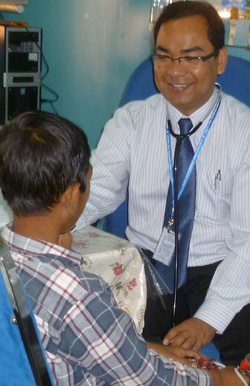Mastering the Art of Pediatric HIV Treatment
When Children Face Treatment Failure
July 2011—At only 18 months of age, a child with HIV was brought into a Bangkok clinic already experiencing first-line antiretroviral therapy (ART) failure. Given her age and local drug availability, her doctor had limited choices for constructing a second-line regimen. If the child developed treatment failure again, there would be few options to which the doctor could turn.

TREAT Asia investigator Dr. Nik Khairulddin Nik
Yusoff is helping train pediatricians on treatment
failure.
|
Such stories can be troublingly familiar to physicians caring for children with HIV in Asia. Early treatment failure presents a serious threat to almost 40,000 children estimated to be on ART in the region. When failure occurs and patients are no longer responding to ART, clinicians need to determine how to construct a new regimen to avoid the use of less effective medicines that can make drug resistance worse. Since few countries in the region provide free access to routine viral load monitoring, pediatricians often have to rely on treatment failure criteria that may not be sensitive enough to identify children who need immediate intervention.
To help pediatricians across the region better understand the art of managing HIV treatment for children, TREAT Asia is offering a series of specialized workshops as part of a pediatric initiative launched last year through ViiV Healthcare. "Doctors have to weigh the potential consequences of changing drugs too soon or too late," said TREAT Asia Director Annette Sohn, M.D., who is also a pediatric HIV clinician. "Switching too soon carries risks because second-line is the last line of treatment for many HIV patients in the region. But doing it too late can be worse because of increasing drug resistance."
The workshops build on the clinical experience of TREAT Asia network pediatricians by enlisting them to help train colleagues in their own countries. The core curriculum was first presented in August 2010 and the training is now being implemented across the region, led by TREAT Asia clinicians and other local experts.
"With so many of us facing the dilemma of treating HIV-positive children who are failing their regimens, pediatric workshops specially focused on the needs of clinicians in this region are absolutely needed," said Nik Khairulddin Nik Yusoff, M.D., of Malaysia's Hospital Raja Perempuan Zainab II. "Each country is unique in the burden of disease, health systems, and resources, and we certainly learned novel and innovative ways of addressing certain challenges."
After attending the workshop himself in Bangkok, Dr. Nik, a TREAT Asia pediatric network investigator, helped teach a subsequent workshop in Kuala Lumpur, which was attended by more than 40 physicians and nursing staff, and he will do so again in Jakarta for Indonesian pediatricians in July. Organized as one-day programs to reduce the time that clinicians need to be away from their patients, workshops will also be held in Hanoi and Ho Chi Minh City, Viet Nam, in August.
Dr. Sohn is optimistic that the program will help improve treatment and care for Asia's youngest HIV patients. "This initiative gives us a new opportunity to explore this model of education and training, and to utilize our network to spread knowledge about evidence-based treatment," she said.